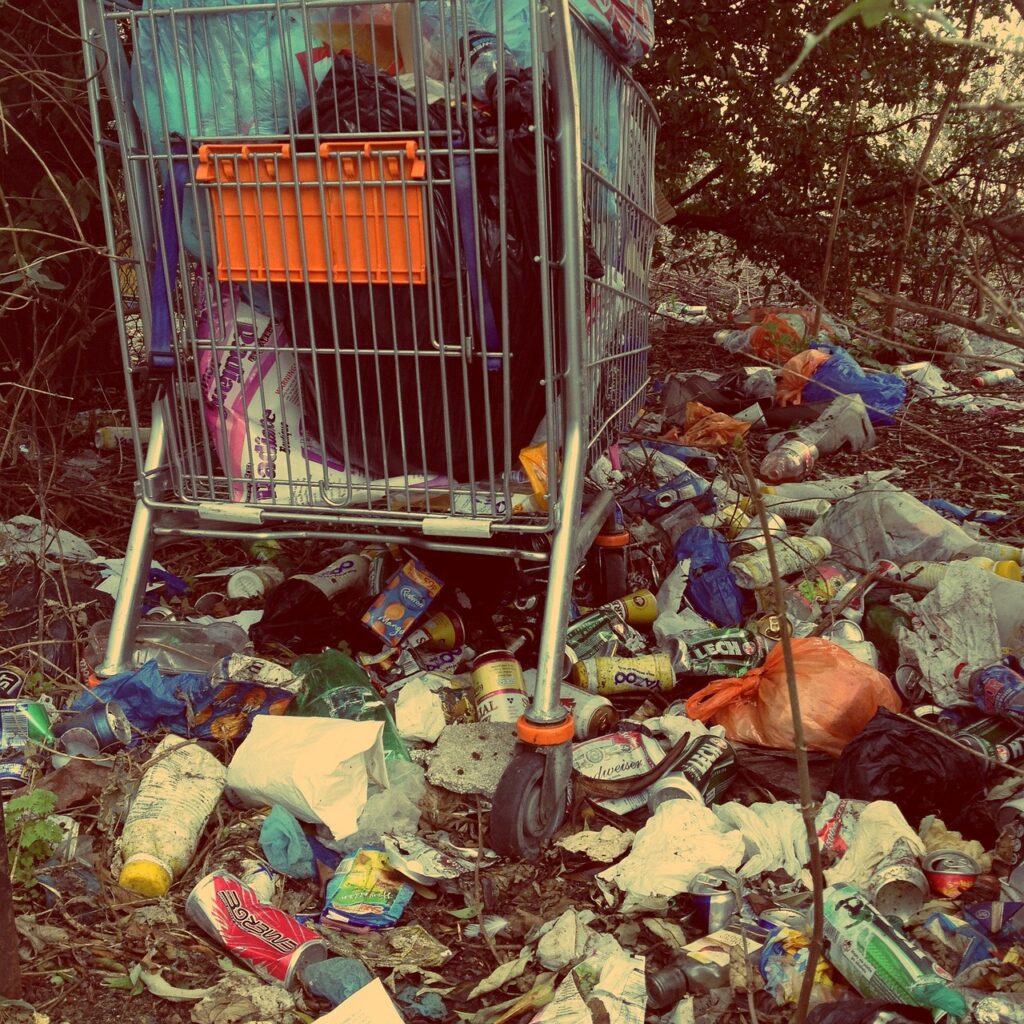Everyone wants to get on with their neighbours but unfortunately, conflicts can arise when neighbours engage in behaviour that causes disputes. One such issue is the act of a neighbour throwing rubbish and garden waste over a fence, which not only strains relationships but also impacts the environment.
In this guide, I will delve into the steps you can take as a UK resident to address this problem effectively and avoid falling out with your neighbours.
Understanding the Problem of Neighbours Throwing Rubbish Over Your Fence
Stories from across the UK echo the frustration and inconvenience caused by neighbours tossing their rubbish, food and garden waste over fences.
Improper waste disposal is not just a nuisance—it can have legal and environmental consequences.
Incorrect disposal of rubbish can also lead to rats and pests and can also impact your enjoyment of your garden. The rubbish and waste may also become smelly.
The UK has regulations in place that mandate proper waste disposal methods.
When waste is carelessly thrown over fences, it not only violates these regulations but also harms the environment.
Neighbours throwing rubbish over your fence could amount to anti-social behaviour, harassment, fly-tipping or a statutory nuisance. It is a serious issue and there are avenues if you are facing this issue with your neighbour, including making a complaint with your local authority, mediation or obtaining legal advice.
If your neighbour has cut your tree that overhangs their garden, if they throw the clippings and branches into your garden, this is actually deemed as fly-tipping and is illegal.
Your neighbour should ask if want the garden waste back and if you don’t then they should dispose of it.
If a neighbour or a stranger comes onto your property to dump rubbish, then this would also be deemed as trespassing.
Understanding these implications is crucial in addressing the issue.

Steps to Take if Your Neighbour is Throwing Rubbish or Waste Over Your Fence
If you find yourself dealing with a neighbour who is throwing rubbish over your fence in the UK, it’s important to approach the situation calmly and thoughtfully.
Here are the steps you can take to address the issue:
Step 1 – Gather Evidence
Documenting instances of a neighbour throwing rubbish over your fence is important for several reasons, including evidence if you need to escalate the issue to authorities or take legal action.
Here’s what you should document if your neighbour is throwing rubbish over your fence:
1 – Date and Time: Note down the exact date and time of each incident when rubbish was thrown over the fence.
2 – Description of the Rubbish: Record what kind of waste was thrown. Be specific about whether it’s food waste, household rubbish, garden waste, or any other type of rubbish.
3 – Photographs or Videos: If possible, take clear photographs or videos of the rubbish that has been thrown over the fence. Make sure the images clearly show the location and the type of waste.
Videos speak louder than words and so I would recommend that you set up an outside security camera to record your neighbour in the act.
Ring Outdoor Camera is a great option and you can get quick delivery with Amazon.
4 – Description of the Incident: Write a brief description of what you observed during each incident. Include details like how the waste was thrown, from which direction, and any potential damage caused.
5 – Frequency: Keep track of how often these incidents occur. Note if there’s a pattern or if the behaviour has been consistent over time.
6 – Impact: Describe how the rubbish has affected your property, whether it’s causing a mess, attracting pests, or posing any health hazards.
7 – Communication Efforts: Document any attempts you’ve made to communicate with your neighbour about the issue. Note the dates of conversations, what was discussed, and any agreements or resolutions reached.
8 – Witnesses: If there are any witnesses to the incidents, ask them if they’d be willing to provide statements or testify if needed.
9 – Correspondence: If you’ve exchanged any written communication with your neighbour about the issue, keep copies of emails, letters, or text messages.
10 – Impact on You: Document how this situation is affecting you emotionally, mentally, and physically. This can be important if you need to explain the impact of the problem to authorities or mediators.
11 – Reporting: If you’ve reported the issue to any relevant authorities or organisations (such as your local council or homeowner association), document the dates, names of individuals you spoke to, and any reference numbers or case IDs.
12 – Legal and Professional Advice: If you’ve consulted legal professionals or mediation services, keep records of these interactions, including advice given and steps recommended.
Maintain a dedicated notebook (such as this evidence notebook from Amazon), folder or digital file to keep all these records organised and easily accessible.
This documentation can be immensely helpful if you need to prove the ongoing issue, demonstrate your efforts to address it, or seek assistance from authorities or legal channels.

Step 2 – Initiate Communication
Engaging in an open and respectful conversation is often the best way to tackle this issue.
Approach the discussion with the intent of finding a solution together.
When addressing your concerns, opt for non-confrontational language.
For instance, you could say, “I’ve noticed some waste has ended up in my garden. Can we discuss ways to prevent this?” This approach promotes a positive and cooperative atmosphere for resolving the problem.
- Approach your neighbour in a friendly and non-confrontational manner.
- Express your concern about the rubbish being thrown into your garden and how it’s affecting you.
- Use “I” statements to avoid sounding accusatory. For example, say, “I’ve noticed some waste in my garden, and I’m concerned about keeping our properties clean.”
You could follow up with a letter to your neighbour and make sure to keep a record.
If you rent your house then you should notify your landlord of the issues you are having, so they are aware you are not leaving rubbish in the garden.
Step 3 – Listen and Understand
Allow your neighbour to share their perspective.
They might not be aware of the impact of their actions or may have reasons for their behaviour. Effective communication can lead to better understanding.
Step 4 – Discuss Solutions
Propose possible solutions to the problem.
This could include asking them to stop throwing rubbish, suggesting proper waste disposal methods, or collaborating on finding a compromise.
Consider offering information about local waste disposal services and recycling options.

Step 5 – Install Physical Barriers
If talking to your neighbour doesn’t work, consider installing physical barriers like fences, hedges, or screens.
These not only serve as a deterrent to waste being thrown over but also add privacy to your property.
Choose materials and designs that align with your aesthetic preferences and local regulations.
You could consider installing a trellis on top of the fence to make it harder for your neighbour to throw rubbish over. Just remember that you need your neighbour’s permission if it is their fence.
Step 6 – Mediation
You could also consider mediation to help facilitate a resolution between you and your neighbour. I also have a blog about using mediation to help with neighbour disputes.
I appreciate that for this to work your neighbour needs to be willing to address the issue.
You can get quick and free quotes from mediators on Bark.com. I have personally used Bark.com for quotes and highly recommend it.

Step 7 – Involve Authorities
If all else fails, consider involving local authorities, such as your council or environmental health department, especially if the waste being thrown is causing a health or environmental hazard.
A neighbour throwing rubbish over the fence could be deemed as anti-social behaviour, as it can cause distress.
I have a separate blog on how to make a complaint to the environmental health team about your neighbour that you can read here.
If you feel the council hasn’t dealt with your complaint sufficiently and you have made more than three complaints then you can activate a ‘community trigger‘.
If the community trigger doesn’t yield results then you can make a formal complaint against your local authority by following the complaints procedure on their website.
As a last resort, you can contact the Local Government and Social Care Ombudsman.
Know Your Legal Rights:
Familiarise yourself with local laws and regulations related to waste disposal, property boundaries, and nuisance behaviour.
If necessary, consult legal advice to understand your rights and options.
If your neighbour is consistently throwing rubbish and waste over your fence this could amount to a statutory nuisance, as it could interfere with your enjoyment of your garden and property. As mentioned above it can also be classified as harassment and anti-social behaviour.
By instructing a solicitor you can ensure to get the legal advice that is specific to your issue.
Final Thoughts About Neighbours Throwing Waste Over The Fence
In conclusion, dealing with a neighbour who is throwing rubbish and waste over your fence can be a challenging situation, but it’s essential to address it with patience, open communication, and a focus on finding a solution that benefits everyone involved.
By documenting incidents, engaging in constructive conversations, understanding your legal rights, and exploring collaborative measures, you can work toward resolving the issue without falling out with your neighbours.
Remember that conflicts with neighbours are not uncommon, and finding common ground is often the best path forward.
Keep the lines of communication open, and be prepared to take appropriate steps if necessary, including involving local authorities or seeking legal advice.
The goal is to foster understanding, promote responsible behaviour, and create a community where everyone can enjoy the peace and comfort of their homes.





Leave a Reply